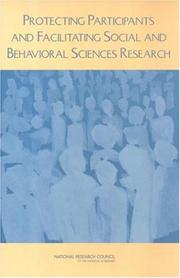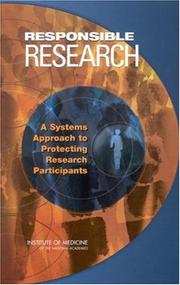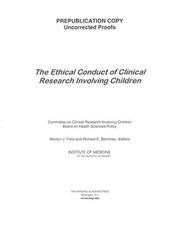| Listing 1 - 10 of 15 | << page >> |
Sort by
|

ISBN: 0763730491 9780763730499 Year: 2006 Publisher: Sudbury, Mass.: Jones and Bartlett,
Abstract | Keywords | Export | Availability | Bookmark
 Loading...
Loading...Choose an application
- Reference Manager
- EndNote
- RefWorks (Direct export to RefWorks)
Book
Year: 2011 Publisher: Santa Monica, CA : RAND Corporation,
Abstract | Keywords | Export | Availability | Bookmark
 Loading...
Loading...Choose an application
- Reference Manager
- EndNote
- RefWorks (Direct export to RefWorks)
In calling for the transformation of military medical education and training, the 2005 Base Realignment and Closure Commission recommended relocating basic and specialty enlisted medical training to a single site to take advantage of economies of scale and the opportunity for joint training. As a result, a joint medical education and training campus (METC) has been established at Fort Sam Houston, Texas. Two of METC's primary long-term goals are to become a high-performing learning organization and to seek accreditation as a community college. Such goals require a clear model of organizational improvement with well-defined metrics for measuring its performance and using research and evaluation to assess and improve that performance. Lessons learned from a review of practices at institutions with similar missions -- such as community colleges, corporate universities, the UK's Defence Medical Education and Training Agency, and other federal agencies, such as the Veterans Health Administration -- establish a clear need for an office of institutional research to help METC attain its organizational goals. They also provide useful recommendations regarding the METC office's structure, scope, and governance.
Institutional review boards (Medicine) --- Medicine, Military --- Medical education --- Ethics Committees, Research --- Military Medicine --- Education, Medical --- Program Evaluation --- organization & administration --- education --- methods
Book
ISBN: 1282544020 9786612544026 0199721661 0197708161 Year: 2008 Publisher: Oxford ; New York : Oxford University Press,
Abstract | Keywords | Export | Availability | Bookmark
 Loading...
Loading...Choose an application
- Reference Manager
- EndNote
- RefWorks (Direct export to RefWorks)
Considering historical triumphs of research as well as tragedies, the textbook provides a framework for analysing the ethical aspects of research studies with human beings. Through both conceptual analysis and systematic reviews of empirical data, the textbook examines a wide range of issues.
Human experimentation in medicine --- Clinical trials --- Medical ethics. --- Moral and ethical aspects. --- Human Experimentation --- Ethics Committees, Research. --- Ethics, Research. --- Research Subjects --- ethics. --- legislation & jurisprudence.
Periodical
ISSN: 19457367 Year: 2001 Publisher: Atlanta, GA : American Health Consultants
Abstract | Keywords | Export | Availability | Bookmark
 Loading...
Loading...Choose an application
- Reference Manager
- EndNote
- RefWorks (Direct export to RefWorks)
Medical ethics --- Medical ethics. --- Ethics Committees, Research --- organization & administration. --- Biomedical ethics --- Clinical ethics --- Ethics, Medical --- Health care ethics --- Medical care --- Medicine --- Moral and ethical aspects --- Bioethics --- Professional ethics --- Nursing ethics --- Social medicine --- Medical Ethics & Philosophy
Book
ISBN: 9780195168655 0195168658 9780199768639 0199768633 Year: 2008 Publisher: New York: Oxford university press,
Abstract | Keywords | Export | Availability | Bookmark
 Loading...
Loading...Choose an application
- Reference Manager
- EndNote
- RefWorks (Direct export to RefWorks)
Human experimentation in medicine --- Clinical trials --- Medical ethics --- Human Experimentation --- Ethics Committees, Research --- Ethics, Research --- Research Subjects --- Moral and ethical aspects --- ethics --- legislation and jurisprudence --- Medical ethics. --- Ethics Committees, Research. --- Ethics, Research. --- Moral and ethical aspects. --- ethics. --- legislation & jurisprudence. --- experiment, experimenteel onderzoek (mensen) --- biomedisch, medisch-wetenschappelijk onderzoek --- ethiek (ethische aspecten) --- Biomedical ethics --- Clinical ethics --- Ethics, Medical --- Health care ethics --- Medical care --- Medicine --- Bioethics --- Professional ethics --- Nursing ethics --- Social medicine --- Controlled clinical trials --- Patient trials of new treatments --- Randomized clinical trials --- Trials, Clinical --- Clinical medicine --- expérimentation sur la personne humaine (chez l'humain) --- recherche biomédicale --- ethique (aspects éthiques) --- Research --- Human experimentation in medicine - Moral and ethical aspects --- Clinical trials - Moral and ethical aspects --- Human Experimentation - ethics --- Research Subjects - legislation and jurisprudence

ISBN: 0309088526 0309511364 9780309511360 9780309088527 Year: 2003 Publisher: Washington, D.C. : National Academies Press,
Abstract | Keywords | Export | Availability | Bookmark
 Loading...
Loading...Choose an application
- Reference Manager
- EndNote
- RefWorks (Direct export to RefWorks)
Social sciences --- Human experimentation in psychology --- Confidential communications --- Ethics committees. --- Sciences sociales --- Expérimentation humaine en psychologie --- Enquêtes sociales --- Comités d'éthique --- Research --- Moral and ethical aspects. --- Social surveys. --- Recherche --- Aspect moral --- Confidentialité --- Confidential communications -- Social surveys. --- Human experimentation in psychology -- Moral and ethical aspects. --- Social sciences -- Research -- Moral and ethical aspects. --- Ethics committees --- Patient Rights --- Forensic Psychiatry --- Social Control, Formal --- Behavioral Sciences --- Jurisprudence --- Ethics Committees --- Risk Management --- Investigative Techniques --- Risk --- Biomedical Research --- Epidemiologic Measurements --- Anthropology, Education, Sociology and Social Phenomena --- Analytical, Diagnostic and Therapeutic Techniques and Equipment --- Behavioral Disciplines and Activities --- Human Rights --- Science --- Ethics --- Professional Staff Committees --- Organization and Administration --- Health Care Economics and Organizations --- Probability --- Psychiatry --- Sociology --- Public Health --- Natural Science Disciplines --- Humanities --- Statistics as Topic --- Environment and Public Health --- Psychiatry and Psychology --- Health Services Administration --- Health Care --- Health Care Quality, Access, and Evaluation --- Quality Assurance, Health Care --- Professional Practice --- Disciplines and Occupations --- Health Care Evaluation Mechanisms --- Epidemiologic Methods --- Quality of Health Care --- Confidentiality --- Behavioral Research --- Ethics Committees, Research --- Informed Consent --- Human Experimentation --- Risk Assessment --- Social Sciences --- Government Regulation --- Management --- Business & Economics --- Management Styles & Communication --- Social Sciences - General --- Moral and ethical aspects --- Social surveys --- Expérimentation humaine en psychologie --- Enquêtes sociales --- Comités d'éthique --- Confidentialité --- Experimentation on humans, Psychological --- Psychological experimentation on humans --- Committees --- Psychology --- Psychology, Experimental --- Experiments

ISBN: 0309084881 9786610209392 1280209399 030950046X 9780309500463 6610209391 9781280209390 9780309084888 0305084881 0309169038 Year: 2003 Publisher: Washington, D.C. : National Academies Press,
Abstract | Keywords | Export | Availability | Bookmark
 Loading...
Loading...Choose an application
- Reference Manager
- EndNote
- RefWorks (Direct export to RefWorks)
Outlines an approach to ensure the protection of participants through the establishment of effective Human Research Participant Protection Programs (HRPPP). Topics covered in this book include improved research review processes, recognition and integration of research participants contributions to the system, and vigilant maintenance of HRPPP performance. When 18-year-old Jesse Gelsinger died in a gene transfer study at the University of Pennsylvania, the national spotlight focused on the procedures used to ensure research participants safety and their capacity to safeguard the well-being of those who volunteer for research studies. "Responsible Research" outlines a three-pronged approach to ensure the protection of every participant through the establishment of effective Human Research Participant Protection Programs (HRPPPs). The approach includes: improved research review processes; recognition and integration of research participants contributions to the system, and vigilant maintenance of HRPPP performance. Issues addressed in the book include the need for in-depth, complimentary reviews of science, ethics, and conflict of interest reviews; desired qualifications for investigators and reviewers; the process of informed consent; federal and institutional oversight; and the role of accreditation. Recommendations for areas of key interest include suggestions for legislative approaches, compensation for research-related injury, and the refocusing of the mission of institutional review boards. "Responsible Research" will be important to anyone interested in the issues that are relevant to the practice of using human subjects as research participants, but especially so to policy makers, research administrators, investigators, and research sponsors but also including volunteers who may agree to serve as research participants.
MEDICAL --- Research --- Ethics --- Human Rights --- Epidemiologic Study Characteristics as Topic --- Jurisprudence --- Professional-Patient Relations --- Investigative Techniques --- Social Control Policies --- Biomedical Research --- Accident Prevention --- Persons --- Social Control, Formal --- Professional Staff Committees --- Ethics Committees --- Therapeutics --- Health Care Quality, Access, and Evaluation --- Policy --- Health Care Economics and Organizations --- Named Groups --- Humanities --- Interpersonal Relations --- Accidents --- Sociology --- Quality Assurance, Health Care --- Health Care Evaluation Mechanisms --- Analytical, Diagnostic and Therapeutic Techniques and Equipment --- Science --- Professional Practice --- Quality of Health Care --- Health Care --- Social Sciences --- Public Health --- Psychology, Social --- Natural Science Disciplines --- Disciplines and Occupations --- Anthropology, Education, Sociology and Social Phenomena --- Organization and Administration --- Environment and Public Health --- Behavior and Behavior Mechanisms --- Psychiatry and Psychology --- Health Services Administration --- Human Experimentation --- Safety --- Government Regulation --- Public Policy --- Conflict of Interest --- Ethics Committees, Research --- Informed Consent --- Clinical Protocols --- Researcher-Subject Relations --- Ethical Review --- Patient Rights --- Clinical Trials Data Monitoring Committees --- Research Subjects --- experiment, experimenteel onderzoek (mensen) --- ethiek (ethische aspecten) --- geïnformeerde vrijwillige toestemming (instemming) --- proefpersonen --- Verenigde Staten --- belangenconflict --- expérimentation sur la personne humaine (chez l'humain) --- ethique (aspects ethiques) --- consentement libre et éclairé --- sujets (participants) d'expérimentation --- Etats Unis --- conflit d'intérêt --- Human experimentation in medicine --- Medical ethics. --- Medical protocols. --- Patients --- Moral and ethical aspects. --- Legal status, laws, etc. --- Patients' rights --- Clinical algorithms --- Clinical protocols --- Patient care plans --- Plans for patient care --- Protocols in medicine --- Biomedical ethics --- Clinical ethics --- Ethics, Medical --- Health care ethics --- Medical care --- Medicine --- Moral and ethical aspects --- Clinical medicine --- Medical records --- Bioethics --- Professional ethics --- Nursing ethics --- Social medicine --- Medical ethics --- Medical protocols --- Legal status, laws, etc

ISBN: 0309091810 9786610208715 1280208716 030953125X 9780309531252 9780309091817 0309133386 Year: 2004 Publisher: Washington, D.C. : National Academies Press,
Abstract | Keywords | Export | Availability | Bookmark
 Loading...
Loading...Choose an application
- Reference Manager
- EndNote
- RefWorks (Direct export to RefWorks)
Human experimentation in medicine. --- Pediatrics --- Biomedical Research --- Human Experimentation. --- Research Subjects. --- Research --- Moral and ethical aspects. --- ethics --- Child. --- Electronic books. -- local. --- Pediatrics -- Research -- Moral and ethical aspects. --- Government Regulation --- Human Experimentation --- Comprehension --- Adolescent --- Child --- Ethics Committees, Research --- Fees and Charges --- Risk Assessment --- Minors --- Research Subjects --- Persons --- Ethics Committees --- Social Control, Formal --- Risk --- Epidemiologic Measurements --- Economics --- Cognition --- Investigative Techniques --- Risk Management --- Age Groups --- Sociology --- Ethics --- Named Groups --- Professional Staff Committees --- Public Health --- Health Care Economics and Organizations --- Analytical, Diagnostic and Therapeutic Techniques and Equipment --- Probability --- Mental Processes --- Organization and Administration --- Science --- Statistics as Topic --- Health Care --- Health Services Administration --- Humanities --- Environment and Public Health --- Professional Practice --- Psychological Phenomena and Processes --- Health Care Quality, Access, and Evaluation --- Social Sciences --- Quality Assurance, Health Care --- Natural Science Disciplines --- Epidemiologic Methods --- Disciplines and Occupations --- Anthropology, Education, Sociology and Social Phenomena --- Psychiatry and Psychology --- Health Care Evaluation Mechanisms --- Quality of Health Care --- Medicine --- Health & Biological Sciences --- Paediatrics --- Pediatric medicine --- Experimentation on humans, Medical --- Medical experimentation on humans --- Children --- Medical ethics --- Medicine, Experimental --- Clinical trials --- Diseases --- Health and hygiene --- Human experimentation in medicine --- Research&delete& --- Moral and ethical aspects
Book
ISBN: 3319207040 3319207059 Year: 2016 Publisher: Cham : Springer International Publishing : Imprint: Springer,
Abstract | Keywords | Export | Availability | Bookmark
 Loading...
Loading...Choose an application
- Reference Manager
- EndNote
- RefWorks (Direct export to RefWorks)
As an Institutional Review Board (IRB) member, you must balance two interests. Your committee protects subjects and it permits the research that improves our health and lives. Balanced Ethics Review, drawing on basic principles of ethics and regulation, explains how to conduct this balancing task. It does not always provide the answer to knotty questions—that is your job—but it suggests a way of thinking, one that will help you reach morally-justified decisions that respect both subject welfare and our shared need for the fruits of research.
Ethics Committees, Research --- Human Experimentation --- Ethics Committees --- Investigative Techniques --- Research --- Biomedical Research --- Professional Staff Committees --- Ethics --- Analytical, Diagnostic and Therapeutic Techniques and Equipment --- Science --- Quality Assurance, Health Care --- Health Care Quality, Access, and Evaluation --- Humanities --- Natural Science Disciplines --- Professional Practice --- Health Care --- Organization and Administration --- Disciplines and Occupations --- Health Services Administration --- Medical ethics. --- Medicine --- Human experimentation in medicine --- Institutional review boards (Medicine) --- Moral and ethical aspects. --- Boards, Institutional review (Medicine) --- IRBs (Medicine) --- Medical institutional review boards --- Review boards, Institutional (Medicine) --- Clinical sciences --- Medical profession --- Biomedical ethics --- Clinical ethics --- Ethics, Medical --- Health care ethics --- Medical care --- Moral and ethical aspects --- Human biology --- Life sciences --- Medical sciences --- Pathology --- Physicians --- Bioethics --- Professional ethics --- Nursing ethics --- Social medicine --- Medical ethics committees --- Evaluation --- Anthropology. --- Epidemiology. --- Psychiatry. --- Public Health. --- Medicine and psychology --- Mental health --- Psychology, Pathological --- Diseases --- Public health --- Human beings --- Public health. --- Community health --- Health services --- Hygiene, Public --- Hygiene, Social --- Public health services --- Public hygiene --- Social hygiene --- Health --- Human services --- Biosecurity --- Health literacy --- Medicine, Preventive --- National health services --- Sanitation --- Primitive societies --- Social sciences

ISBN: 1557985758 Year: 1999 Publisher: [Place of publication not identified] American Psychological Association
Abstract | Keywords | Export | Availability | Bookmark
 Loading...
Loading...Choose an application
- Reference Manager
- EndNote
- RefWorks (Direct export to RefWorks)
University psychology departments conduct innumerable research studies annually and rely heavily on departmental subject pools for their experiments. How are the rights and welfare of those subjects protected? How can universities improve their administrative practices so that their research programmes are successful and ethically run? This volume reviews empirical evidence on the structure and functioning of departmental subject pools nationwide and of the institutional review boards that oversee them. The case studies and practical lessons offered by this book should be an important new resource for researchers and university adminstrators interested in the welfare of human subjects. University psychology departments conduct many annual research studies and rely on departmental subject pools for their experiments. This text reviews empirical evidence on the structure and functioning of departmental subject pools and of the institutional review boards that oversee them.
Human experimentation in psychology --- Psychology --- experiment, experimenteel onderzoek (mensen) --- psychologie (psychologische aspecten) --- Behavioral sciences --- Mental philosophy --- Mind --- Science, Mental --- Human biology --- Philosophy --- Soul --- Mental health --- Experimentation on humans, Psychological --- Psychological experimentation on humans --- Psychology, Experimental --- Moral and ethical aspects --- Research&delete& --- expérimentation sur la personne humaine (chez l'humain) --- psychologie (aspects psychologiques) --- Experiments --- Research --- Data Collection --- Vulnerable Populations --- Ethics Committees --- Students --- Ethics Committees, Research --- Faculty --- Informed Consent --- Research Design --- Organization and Administration --- Professional Staff Committees --- Research Personnel --- Universities --- Human Experimentation --- Patient Selection --- Behavioral Research --- Ethics, Medical --- Sexuality --- Attitude --- Research Subjects --- Professional Misconduct --- Biomedical Research --- Jurisprudence --- Occupational Groups --- Investigative Techniques --- Health Care Evaluation Mechanisms --- Patient Care Management --- Quality Assurance, Health Care --- Ethics --- Patient Rights --- Social Behavior --- Education --- Information Science --- Persons --- Ethics, Clinical --- Reproductive Physiological Phenomena --- Sexual Behavior --- Health Services Administration --- Epidemiologic Methods --- Schools --- Education, Nonprofessional --- Behavioral Sciences --- Professional Practice --- Science --- Methods --- Behavior and Behavior Mechanisms --- Named Groups --- Anthropology, Education, Sociology and Social Phenomena --- Behavioral Disciplines and Activities --- Health Care Quality, Access, and Evaluation --- Humanities --- Natural Science Disciplines --- Human Rights --- Social Control, Formal --- Public Health --- Ethics, Professional --- Health Care --- Psychiatry and Psychology --- Analytical, Diagnostic and Therapeutic Techniques and Equipment --- Behavior --- Quality of Health Care --- Reproductive and Urinary Physiological Phenomena --- Health Care Economics and Organizations --- Environment and Public Health --- Sociology --- Phenomena and Processes --- Disciplines and Occupations --- Social Sciences --- Delivery of Health Care. --- Moral and ethical aspects. --- Research.
| Listing 1 - 10 of 15 | << page >> |
Sort by
|

 Search
Search Feedback
Feedback About UniCat
About UniCat  Help
Help News
News